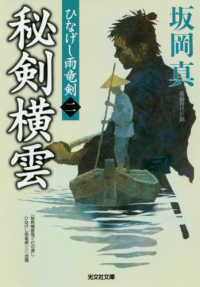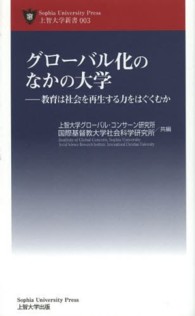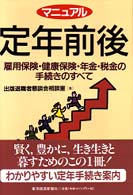- ホーム
- > 洋書
- > ドイツ書
- > Humanities, Arts & Music
- > Humanities
- > general surveys
Description
(Short description)
Dieser zweite Band des Alexander Kluge-Jahrbuchs fokussiert Kluges und Oskar Negts theoretische Arbeit und legt Kluges theoretische Wurzeln offen. Aktueller Stand der Kluge-Forschung
(Text)
Flaschenpost war Adornos resignative Metapher aus dem Jahr 1940 für die eingebüßte Wirkungsmacht der Kritischen Theorie im Exil. Echos einer Flasche heißt für Kluge die bescheidene Optik - etwas indirekt im Glassplitter sehen - womit er wirksame Perspektiven im globalisierten 21. Jahrhundert sucht. Der zweite Band des Kluge-Jahrbuchs widmet sich einerseits Kluges theoretischer Verwandlung am Beispiel seiner Theoriearbeit mit Oskar Negt und andererseits den multimedialen Sichtweisen, die nicht nur seine 'Haltung der Bescheidenheit' zum Ausdruck bringen, sondern auch seine theoretischen Wurzeln offenlegen.
(Text)
Adorno characterized Critical Theory as a message in a bottle in 1940 when the exiled Frankfurt School's sphere of influence was an ocean away from the catastrophes of fascism it sought to fight. Turning Adorno's metaphor on its head some six decades later, Kluge likens his creative method in the interview with Oskar Negt that opens the second volume of the Kluge-Jahrbuch to echoes of light refracted through a bottle: "I can also see something by looking through shards of glass," he explains. Deploying this turn of phrase as its point of departure, this issue of the Jahrbuch devotes its attention first to Kluge's theory work written with Negt, its roots in and adaptation of the Frankfurt School tradition as well as its indebtedness to other schools of thought. In the remainder of the volume, scholars working in five different disciplines across the humanities query Kluge's ways of seeing in film, television and literature.
(Author portrait)
Thomas Combrink ist Literaturwissenschaftler und Mitarbeiter von Alexander Kluge.Prof. Dr. Richard Langston lehrt German Studies an der University of North Carolina at Chapel Hill, USA.








